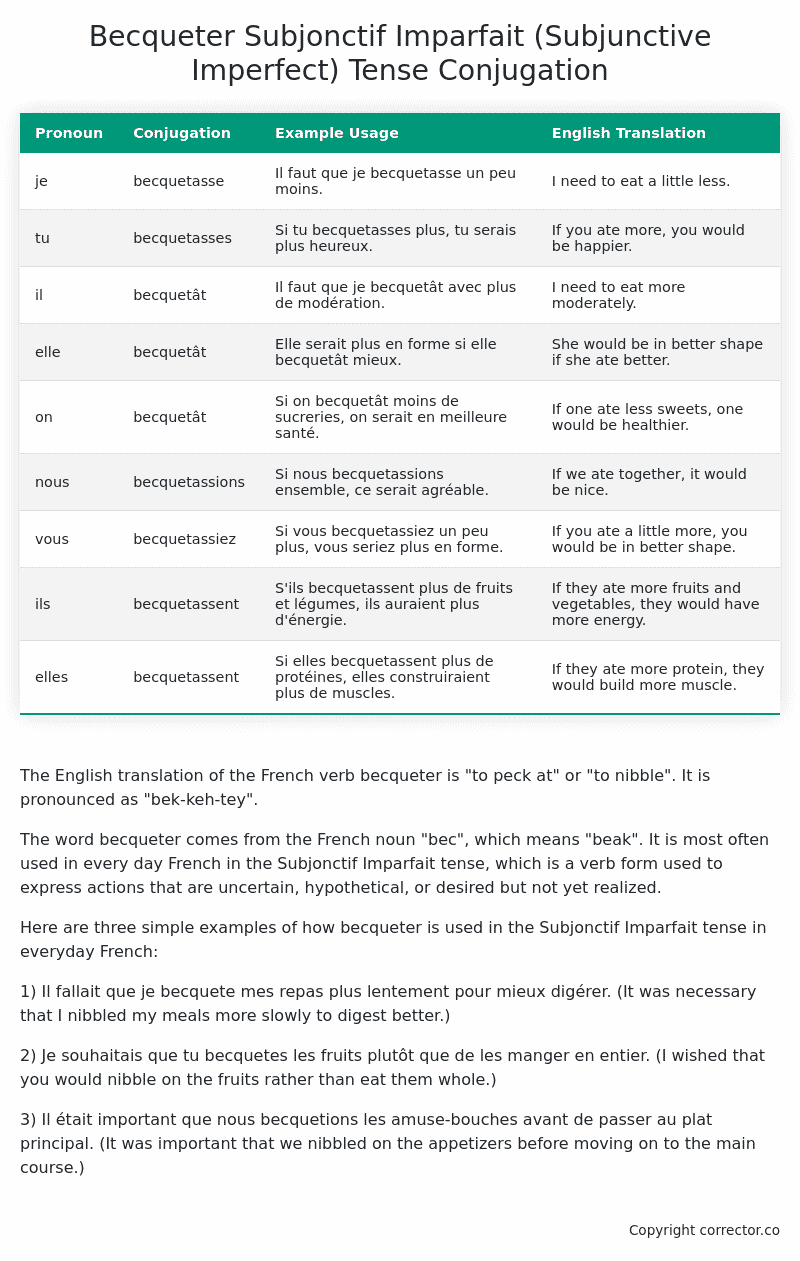Subjonctif Imparfait (Subjunctive Imperfect) Tense Conjugation of the French Verb becqueter
Introduction to the verb becqueter
The English translation of the French verb becqueter is “to peck at” or “to nibble”. It is pronounced as “bek-keh-tey”.
The word becqueter comes from the French noun “bec”, which means “beak”. It is most often used in every day French in the Subjonctif Imparfait tense, which is a verb form used to express actions that are uncertain, hypothetical, or desired but not yet realized.
Here are three simple examples of how becqueter is used in the Subjonctif Imparfait tense in everyday French:
1) Il fallait que je becquete mes repas plus lentement pour mieux digérer. (It was necessary that I nibbled my meals more slowly to digest better.)
2) Je souhaitais que tu becquetes les fruits plutôt que de les manger en entier. (I wished that you would nibble on the fruits rather than eat them whole.)
3) Il était important que nous becquetions les amuse-bouches avant de passer au plat principal. (It was important that we nibbled on the appetizers before moving on to the main course.)
Table of the Subjonctif Imparfait (Subjunctive Imperfect) Tense Conjugation of becqueter
| Pronoun | Conjugation | Example Usage | English Translation |
|---|---|---|---|
| je | becquetasse | Il faut que je becquetasse un peu moins. | I need to eat a little less. |
| tu | becquetasses | Si tu becquetasses plus, tu serais plus heureux. | If you ate more, you would be happier. |
| il | becquetât | Il faut que je becquetât avec plus de modération. | I need to eat more moderately. |
| elle | becquetât | Elle serait plus en forme si elle becquetât mieux. | She would be in better shape if she ate better. |
| on | becquetât | Si on becquetât moins de sucreries, on serait en meilleure santé. | If one ate less sweets, one would be healthier. |
| nous | becquetassions | Si nous becquetassions ensemble, ce serait agréable. | If we ate together, it would be nice. |
| vous | becquetassiez | Si vous becquetassiez un peu plus, vous seriez plus en forme. | If you ate a little more, you would be in better shape. |
| ils | becquetassent | S’ils becquetassent plus de fruits et légumes, ils auraient plus d’énergie. | If they ate more fruits and vegetables, they would have more energy. |
| elles | becquetassent | Si elles becquetassent plus de protéines, elles construiraient plus de muscles. | If they ate more protein, they would build more muscle. |
Other Conjugations for Becqueter.
Le Present (Present Tense) Conjugation of the French Verb becqueter
Imparfait (Imperfect) Tense Conjugation of the French Verb becqueter
Passé Simple (Simple Past) Tense Conjugation of the French Verb becqueter
Passé Composé (Present Perfect) Tense Conjugation of the French Verb becqueter
Futur Simple (Simple Future) Tense Conjugation of the French Verb becqueter
Futur Proche (Near Future) Tense Conjugation of the French Verb becqueter
Plus-que-parfait (Pluperfect) Tense Conjugation of the French Verb becqueter
Passé Antérieur (Past Anterior) Tense Conjugation of the French Verb becqueter
Futur Antérieur (Future Anterior) Tense Conjugation of the French Verb becqueter
Subjonctif Présent (Subjunctive Present) Tense Conjugation of the French Verb becqueter
Subjonctif Passé (Subjunctive Past) Tense Conjugation of the French Verb becqueter
Subjonctif Imparfait (Subjunctive Imperfect) Tense Conjugation of the French Verb becqueter (this article)
Subjonctif Plus-que-parfait (Subjunctive Pluperfect) Tense Conjugation of the French Verb becqueter
Conditionnel Présent (Conditional Present) Tense Conjugation of the French Verb becqueter
Conditionnel Passé (Conditional Past) Tense Conjugation of the French Verb becqueter
L’impératif Présent (Imperative Present) Tense Conjugation of the French Verb becqueter
L’infinitif Présent (Infinitive Present) Tense Conjugation of the French Verb becqueter
Struggling with French verbs or the language in general? Why not use our free French Grammar Checker – no registration required!
Get a FREE Download Study Sheet of this Conjugation 🔥
Simply right click the image below, click “save image” and get your free reference for the becqueter Subjonctif Imparfait tense conjugation!

Becqueter – About the French Subjonctif Imparfait (Subjunctive Imperfect) Tense
Formation
Common Everyday Usage Patterns
Interactions with Other Tenses
Subjonctif Présent
Indicatif Passé Composé
Conditional
Conditional Perfect
Summary
I hope you enjoyed this article on the verb becqueter. Still in a learning mood? Check out another TOTALLY random French verb conjugation!


